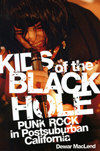Kids of the Black Hole
As a member of Generation X, I’ve often wondered what happened culturally in the mid-to-late 70s. Our society went from peaceful, late-60s hippies to the mass-market and watered-down kitsch of the 80s. Dewar MacLeod’s new book can explain it all.
As a member of Generation X, I’ve often wondered what happened culturally in the mid-to-late 70s. Our society went from peaceful, late-60s hippies to the mass-market and watered-down kitsch of the 80s. Dewar MacLeod’s new book can explain it all.
Kids of the Black Hole: Punk Rock in Postsuburban California delivers what the title promises; multiple chapters hash through the slow rise of and major players in Southern California’s punk rock scene. Readers are given a plethora of interesting bands – along with their insane onstage exploits – to look up. (Some of the bands covered include X, Dead Kennedys, Black Flag, and The Middle Class.) The book follows the ever-changing minutia of a local music scene to such an extreme degree, the message almost drowns in the details. However, MacLeod is careful to point out that the anger and aggression of punk music does not rise out of a vacuum:
In its pursuit of “true rebel music,” [L.A. punk magazine] Slash articulated a hatred of the established music business. Anchoring its definition of punk in a “war” against the record industry . . . the “punk revolution” embraced the “dirty, primitive music that has little to do with the stuff music stations have been pouring in our ears for what seems to be an eternity.”
But I think MacLeod’s title does not match the ambitions scale of his work. More than just a treatise on SoCal punk rock, this book explores and explains the wider youth culture of the time, the reasons punk rock emerged from the perfect storm of soft, acoustic hippie culture and remnants of the wholesome, prosperous, and suburban 50s. The disillusionment that characterized young people of the 70s manifested itself in punk music and reflected a darker and grittier American society. MacLeod gives a superb explanation of this transition:
In contrast to the idealism and socially oriented thinking of sixties youth, youth in the seventies embraced a radical individualism that was critical of pretty much everything. “From getting up in the morning to trust in government,” even “everyday existence” was “difficult to tolerate.” In the view of seventies youth, all social institutions lacked legitimacy, and arbitrariness seemed to be the natural order of things. . . . Punk [music] in postsuburbia did not recreate the youth culture revolts of earlier generations, but reflected instead the fragmentation, isolation, and individualism of the 1970s.
Kids of the Black Hole is a detailed insider’s perspective of the collapse and aftermath of youth culture in the 1970s, analyzing how this collapse manifested itself in a new and intensely energetic form of music. As a Gen X reader, I greatly appreciate the historical elements of this work. MacLeod is analytical, methodic (note the 20+ pages of sources), and starkly truthful about the past. Younger people could benefit from reading about and studying foregone generations, especially when that generation’s fragmentation and isolation so resembles our own. Given all the cultural relevance, Kids of the Black Hole could have just as easily been written about contemporary society and music. If you want to know where the youth of America have been and are headed, pick up this book.





